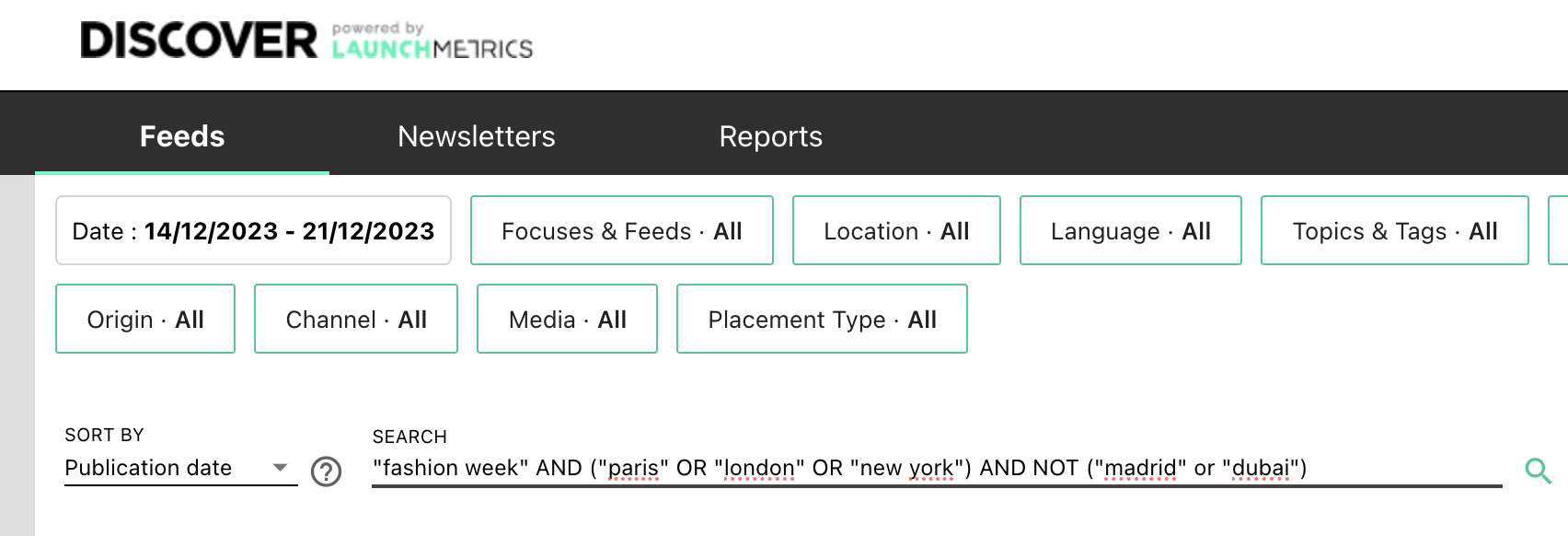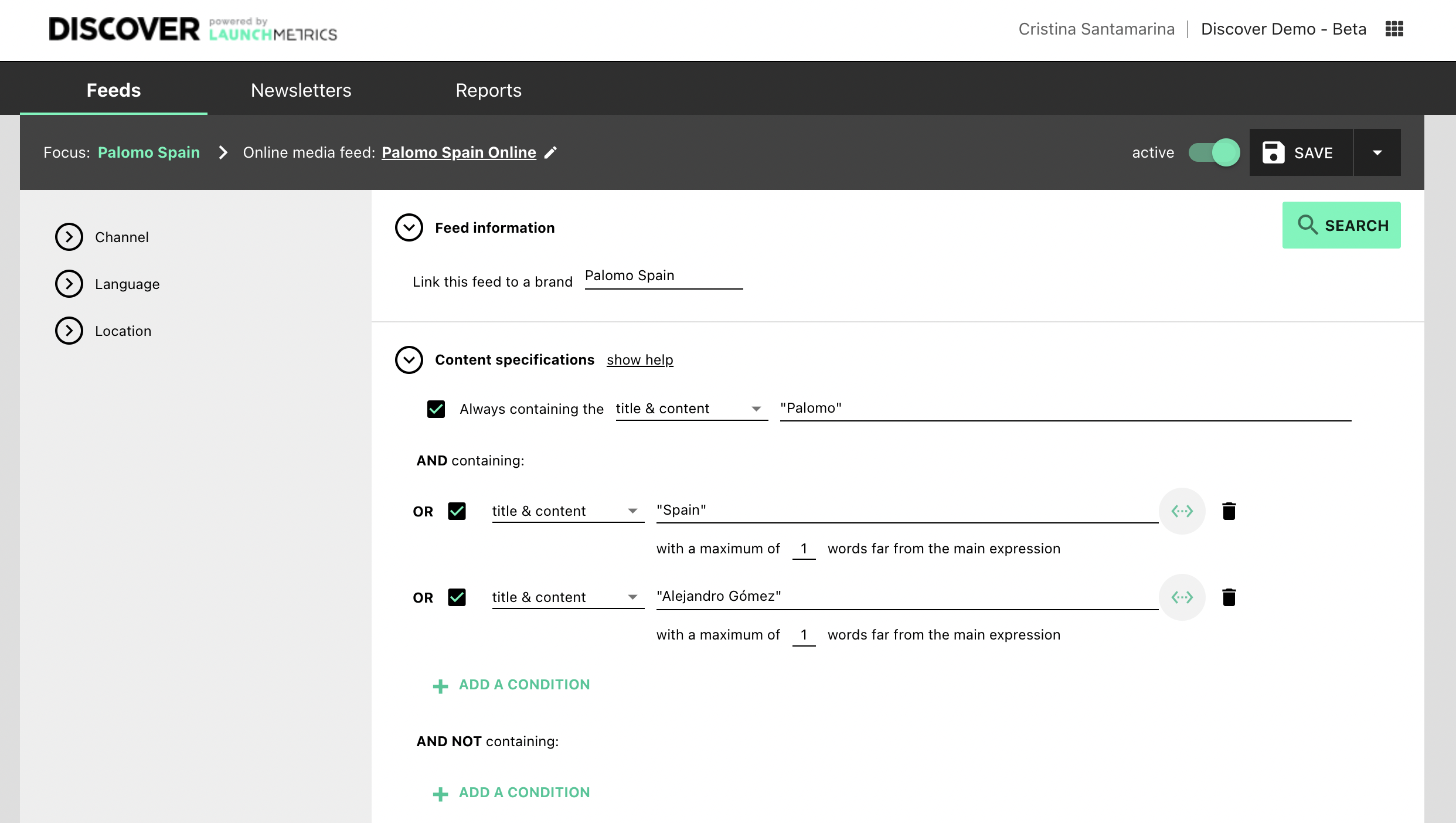What are Boolean Queries?
Boolean queries are searches for keywords that include operator words like AND, OR, and NOT, as well as some symbols. The term Boolean means a result that can only have one of two possible values: true or false.
Where can I use Boolean Queries?
You can enter Boolean queries:
 |
 |
| In the search bar of the Feed Results page, to find specific content. | In the Feed Configuration page, to include or exclude placements that contain or do not contain specific expressions. |
Boolean Query Syntax
| Operator | Example | Result |
|---|---|---|
| launchmetrics | Will find results containing the word launchmetrics | |
| "" | "fashion brands" | Will find results with the phrase fashion brands |
| "" | "fashion brands" england | Will find results containing the phrase fashion brands and the word england |
| * | dat* | Will find results containing words like data, date, dataset, datasheet |
| ? | dat? | Will find results containing words like data, date |
| - | asia -china | Will find results containing the word asia that not mention the word china |
| NOT | asia NOTchina | Will find results containing the word asia that not mention the word china |
| AND | paris AND london | Will find results that mention paris and london |
| OR | paris OR london | Will find results containing the word paris or the word london |
| () | (europe AND paris) OR (europe AND london) | Will find results that mention europe and paris or results that mention europe and london |
| () | ("fashion show" AND ("new york" OR paris) AND (NOT classic)) | Will find results containing the phrase fashion show and the phrases new york or paris and not containing the word classic |
| ~ | "heathrow airport"~3 | Will find results where the words airport and heathrow appear within 3 words of each other. |
| ~ | europe -london "airport gatwick"~3 | Will find results containing the word europe, not containing the word london, and where the words airport and gatwick appear within 3 words of each other. |
| sen: | sen:"Fashion & Style" | Will find results containing the phrase Fashion & Style |
| sen: | (sen:"Fashion & Style" AND (sen:@beauty OR Beauty) | Will find results containing the phrase Fashion & Style and the words @beauty or beauty |
Advanced queries in the Search Bar
You can combine the power of boolean queries and some placement fields we made available to you to find very specific content and define tag automations from your feed results page.
For example, you can type MIV: [1000 TO 10000] to filter articles in this MIV range.
Here is the list of the fields available for these advanced queries:
| Field | Example | Result |
|---|---|---|
| date | date:[YYYY-MM-DD] | Displays content from a specific date |
| date:[YYYY-MM-DDTHH:mm:ss TO YYYY-MM-DDTHH:mm:ss] | Displays content with an date within a range | |
| date:"now/-1d" | Displays content published the day before the current date. You may replace 1 by any other number to collect data a specific date, n days ago. | |
| date:"now/-1m" | Displays content published one month before the current date. You may replace 1 by any other number to collect data a specific date, n months ago. | |
| miv | miv:[10000 TO 100000] | Displays content with an MIV within a range |
| audience | audience:[10000 TO 100000] | Displays content with a audience within a range |
| reach | reach:[10000 TO 100000] | Displays content with a reach within a range |
| print.brand.name | print.brand.name:"Dior" | Displays print articles where a brand is referenced |
| print.persons.name | print.persons.name:"Rafael Maqueda" | Displays print articles where the person is named as a stylist, photographer, stylist, editor… |
| url | url:"https://www.vogue.com/article/7-holiday-style-ideas-from-the-pre-fall-2024-collections" | Displays online and social content for a specific URL. |
| instagram.screen_name | instagram.screen_name:"chiaraferragni" | Displays instagram content published by a specific account |
| tiktok.screen_name | tiktok.screen_name:"chiaraferragni" | Displays tiktok content published by a specific account |
| twitter.screen_name | twitter.screen_name:"chiaraferragni" | Displays twitter content published by a specific account |
Best Practices using Boolean Queries
- In the feed management page, instead of writing long queries in a single line, use Discover's interface elements to break your query. This makes reviewing and maintaining queries easier, and improves the performance of the query.